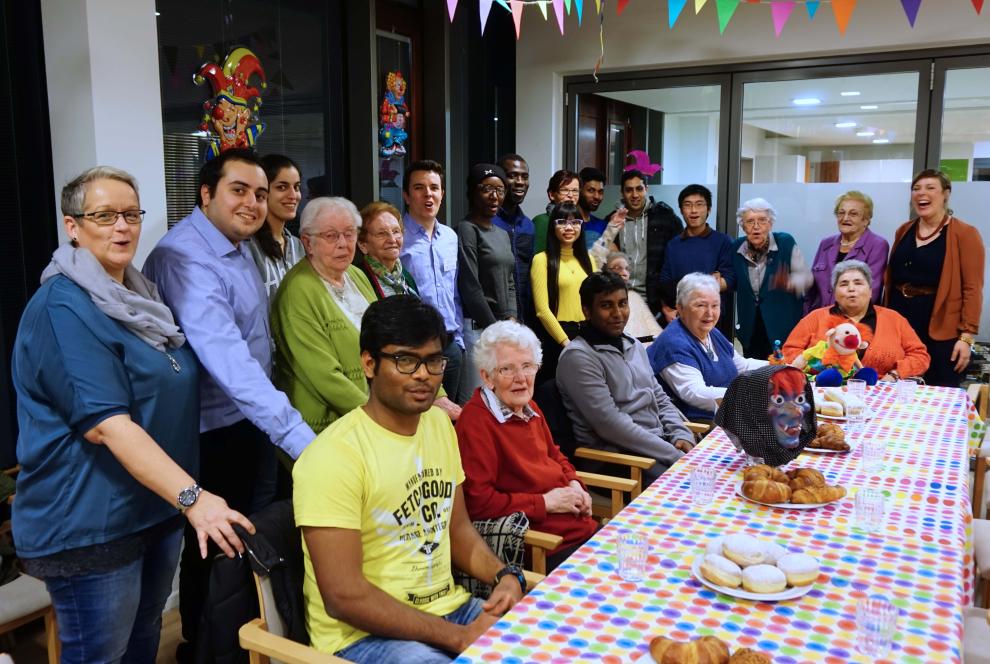Befriending seniors helps with homesickness
Rhine-Waal students spend an evening with local seniors
Anh Nguyen Minh Mai is a soft-spoken and shy 26 year old hailing from Vietnam. Anh, who recently finished her first semester of study at Rhine-Waal University of Applied Sciences in Kleve, has only recently begun to learn German, but that doesn’t stop her from visiting the Herz-Jesu-Kloster Senior Centre in Kleve this evening. In fact, she heads there alone. When she enters the building, she finds she’s the first student to arrive, and is warmly greeted by the senior centre’s director Susanne Lamers. Anh is one of many students who have come this evening to take part in the monthly ‘Having a Grandfriend’ event, organised by the Welcome Centre of Rhine-Waal University of Applied Sciences in conjunction with the Herz-Jesu-Kloster Senior Centre. The event’s purpose is to bring two very different groups together, bridging both age and cultural gaps.
Organised by Julia Ilq, Director of the Welcome Centre, and David Duque, Welcome Centre Tutor, ‘Having a Grandfriend’ is a response to the requests of many international students at Rhine-Waal University of Applied Sciences. International students at Rhine-Waal University of Applied Sciences represent over 100 different nationalities, and many have travelled quite far to study in Kleve. Duque and Ilg explain: “The event is generally held in English, because many students are still learning German. These students are keen for more opportunities to practice their German and learn more about other cultures.” What’s more, students often find that these friendly encounters are very good at keeping homesickness at bay.
But back to our intrepid Anh, who is not alone for long this evening. As more and more students begin to arrive, many seniors begin joining the group as well. Eighty-eight year old Maria Boßmann, for example, who sits down next to Anh and introduces herself. After a friendly handshake, they quickly find common ground for a conversation: Boßmann’s daughter lived in Vietnam for four and a half years. Soon enough, both women are engaged in a deep conversation, despite vastly different cultural, regional and religious backgrounds and certain language barriers.
But as far as barriers go: “We don’t really have any, at least none due to cultural or religious differences,” says Monika van Uffelt, a member of the centre’s professional support staff who also participates in the project. “In fact, the multilingual students are usually the shy ones at these events, as the seniors aren’t at all reluctant to approach a new face and dive into a conversation.” These good-natured conversations offer a unique opportunity to exchange thoughts and feelings. Take one student from India, for example, who admitted to his conversation partner that he had experienced significant culture shock during his first weeks in Germany, thousands of kilometres from home. His partner, sympathetic to his story, could also relate to that intimidating feeling of new surroundings, as she had experienced something similar after moving into the senior centre, though her previous home was a scant few kilometres away.
Cultural differences are often more pronounced during certain times of the year, for example during Carnival. Mohammad Bassiouny, of Egypt, who has already picked up quite a bit of German, finds the Lower Rhine’s many Carnival festivities both interesting and amusing. “We don’t celebrate Carnival where I’m from. We also don’t dress up in costumes. I still find that unusual, and a bit wild,” he laughs while glancing at the ugly, but still very traditional, Carnival mask of an old woman (German: Möhnenmaske) lying on the table in the centre of the group.
Seventy-five year old Christa van Appeldorn is sharing many laughs with student Prasanna Kumar Sakhinel and enjoying their conversation. The practicing Hindu from India isn’t very familiar with German churchgoing traditions – for van Appeldorn an important part of her day – which lead to an interesting and good-natured conversation on the two countries’ religious traditions. By this time another pair, senior Maria Dercks and student Pavithran Boopathy, have also exchanged greetings and are engrossed in an interactive presentation planned for the evening entitled “Carnival of Cultures”.
The evening’s event goes off without a hitch, with the exception of a faux pas discovered by Elisabeth Haas. The food for the evening, provided thanks to funding by the DAAD (German Academic Exchange Service), included ‘Berliner’, or German jelly donuts. “The donuts are certainly delicious,” remarked a smiling Haas, “but during Carnival it’s tradition to serve ‘Bolle Beuskes’ [deep fried cheese curds], not ‘Berliner’!” While the students from Indonesia, Egypt, Turkey, Vietnam, India and Columbia haven’t had any ‘Bolle Beuskes’ yet, there’ll be plenty of time for them at next month’s meeting.

